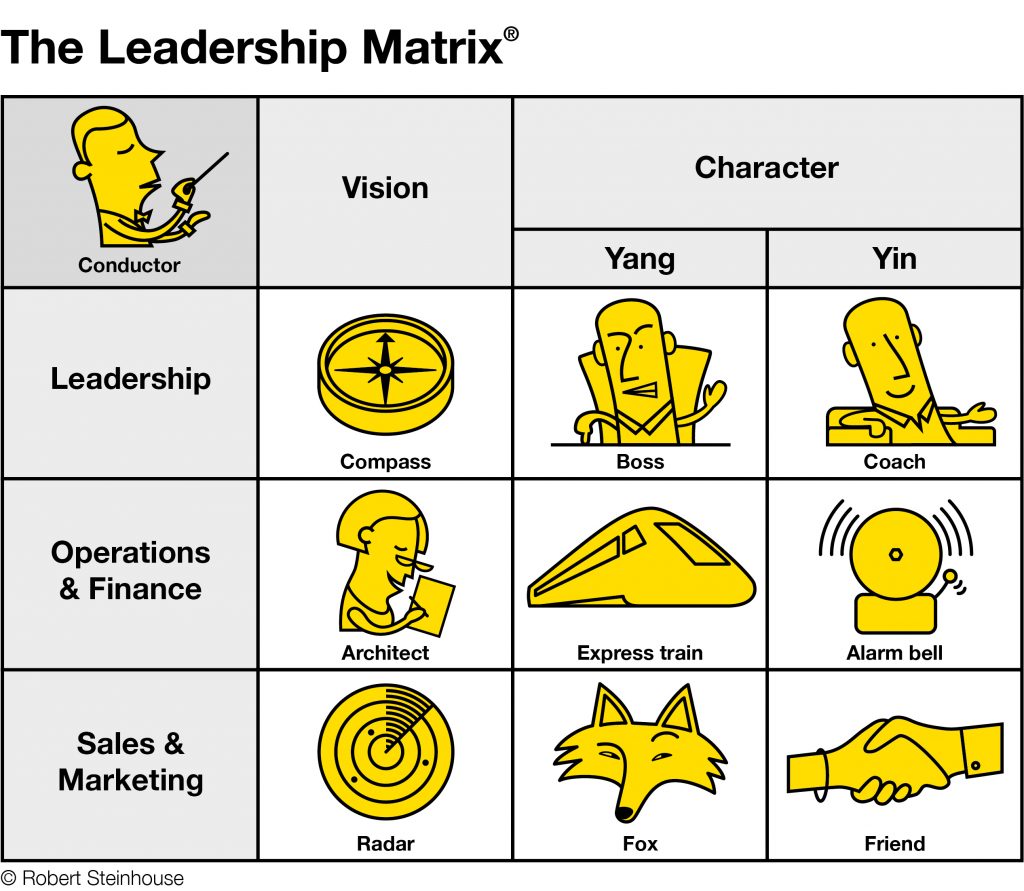The Shadows of Leadership: How to Take Advice and Understand Your Own Weaknesses

In my model, The Leadership Matrix (see above), each character, or Archetype, represents a positive business energy. At the same time, each Archetype also has its own unique Shadow, or problematic manifestation.
In this blog I will explain how aspects of the personality of leaders can diminish the benefits of advice. I will explore three Shadows:
- The Shadow of the Boss Archetype – The Bully. Boss energy is grounded and powerful; the energy is alert awareness, showing courage even when fear is present. The Bully can present itself when the Boss energy becomes overwhelmed. However, the Bully often manifests itself because people lack Boss energy and are only able to express their needs and assert boundaries when they become angry.
- The Shadow of the Alarm Bell Archetype – The Headless Chicken. A good Alarm Bell lets a leader know when a genuine emergency is present, rather than the stresses and over-reactions that confront us every day. The Headless Chicken can become a regular visitor when a diet of adrenaline and cortisol transform this caution into a state of constant vigilance – sadly removing the ability to ‘hear’ the Alarm Bell.
- The Shadow of the Radar Archetype – The Guru. A good Radar shows that a leader intuitively knows their market, they can spot changing trends and adjust their businesses accordingly. The Guru is when the phrase, ‘nothing fails like success’ has truly taken hold and they begin to believe they have some infallible magical gift.
The importance of learning from experts
I found advisers were essential for my success in business – either learning from experts I employed or rapidly learning how to achieve something new by working with external specialists. Advisers from consultants, lawyers, accountants to experts in specialist business functions abound. However, in my view, effective leadership is about listening to these myriads of different opinions, but also making decisions that may contradict them, or only consider the parts considered relevant. Good leadership is an interesting mixed attitude: open minded scepticism. This includes the ability to learn new things quickly – at a relatively high level – but with sufficient detail, so the leader understands the core principles of what is actually taking place around them. For example, salespeople need to have a relatively good understanding of the principles of finance and vice-versa for finance people if they wish to move into a leadership role.
How can shadows appear when you are being advised?
Building the ability to listen in an open-minded way to assertive and experienced advisers can be intimidating, but is an essential skill. However, people who have felt themselves to be forced into things or pushed around when they were younger often have a strong negative reaction when people advise them. This can manifest itself in different ways:
- Doing it all yourself – The Bully
People who react this way refuse to listen to anyone and assume only they have the correct answers. Although it is important to believe in yourself, this excessive assertiveness usually masks a fearful side where they confuse being forced into doing things as the same as being forced to take advice. This is not the case; they are being asked to consider not to agree with advice. What can accompany this is a form of obsessiveness, where the leader believes they have to control all aspects of the organisation – failing to delegate or listen to anyone. Sadly, they don’t have the skills to run other departments (as they refuse to learn the wider skillsets effectively) and they tend to stay focused and biased to their original expertise. What happens as the business (or their role) grows is they become a bottleneck, constantly firefighting until the situation becomes unsustainable.
- Always Deferring to the Experts – The Headless Chicken
Conversely, other people have been raised with a sense of deference, especially for so-called experts and have the opposite reaction (although it probably comes from a similar place to the Bully: feeling powerless when younger). They lose confidence in their ability to make decisions and blindly follow advice which can be either impractical or simply wrong (it can also be very time consuming). Likewise, they are swayed by the often-contradictory advice they receive and become frozen, unable to make decisions – creating that same bottleneck. In this case they consciously lack the self-belief that they can gain a broad understand of other skill sets.
These two previous examples represent the two ‘extremes’ of the Shadow; sometimes known as the inflated and deflated version. However, a third shadow is also worth mentioning, where advice is considered not threatening, but irrelevant:
- Believing expertise to be a hindrance – The Guru
As leaders progress, they start managing new functions and teams with skillsets different to their own original expertise. If these leaders do not continue to take advice from senior members of their team or from external advisors, they can begin to lose a sense of what these functions actually do. Although you do not need to be an expert to manage other experts, it is essential that you make the effort to learn these new areas sufficiently to comprehend what is actually happening. I have a belief that nothing is so complex in business that I can’t understand the essence of what is happening and form coherent judgements accordingly. However, this new understanding takes an ongoing effort and some humility to continue to learn. Sadly, some leaders eventually de-couple their knowledge from their business activities and form a belief that managing a business is a completely generic activity and it is sufficient to rely on their past success and gravitas. They will tend to speak in generalities and make a positive initial impression; however, reality soon catches up when something goes wrong and it becomes apparent, they have no idea what to do.
Learn from your shadows
Shadows can lead to potential disaster or they can provide a powerful way for the leader to identify areas they need to improve within themselves. That is why leaders need to be aware of their own shadows. They need to get the right balance between confidently believing in themselves and having the humility to know when they don’t know enough and need to discover something new. This is a hard balance to achieve as different characters will tend towards certain shadows. No one is perfect, however be truthful to yourself: if you find other people’s input difficult to tolerate or fear becoming dominated by them, then know this and learn to know the difference between your historic psychological drivers and the realities of what is needed in the current situation. When you can do this, you can trust yourself as you are making judgements with the full awareness of your own biases. This principle also applies to promoting leaders – without this self-awareness, I would argue they are not ready to move into a leadership role.
The Archetype in top left corner of the Matrix is the one I favour to summarise how to harmonise these potential conflicts: The Conductor. I like to gather a range of different voices and views and see if I can ‘conduct’ a consensus. However, I also appreciate that as the leader – I need to believe this is the best way forward, as advisers advise, and leaders decide.
I will be teaching this model on our Leadership Coaching with NLP webinar on 25th August. You can book your place now.
Did you like this post?
Then check out our events and courses!
Where to find us
For posts, events, free open days and more, follow NLP School on:
Where to find Robbie
Twitter: @RSteinhouse
LinkedIn: Robbie Steinhouse
What to read next
Leadership: The Capability Sets
Leading Yourself Through Uncertainty









